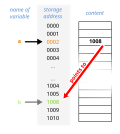object-oriented programming, a class defines the shared aspects of objects created from the class. The capabilities of a class differ between programming languages...
46 KB (5,216 words) - 05:54, 3 November 2024
Computer programming or coding is the composition of sequences of instructions, called programs, that computers can follow to perform tasks. It involves...
31 KB (3,411 words) - 12:47, 6 November 2024
C#, and Objective-C. Prototype-based programming (contrast) Programming paradigms Class (computer programming) Kiselyov, Oleg. "Subtyping, Subclassing...
7 KB (806 words) - 22:18, 1 February 2024
object-oriented programming, inheritance is the mechanism of basing an object or class upon another object (prototype-based inheritance) or class (class-based inheritance)...
32 KB (3,792 words) - 16:56, 30 September 2024
A computer program is a sequence or set of instructions in a programming language for a computer to execute. It is one component of software, which also...
127 KB (13,291 words) - 18:05, 7 November 2024
In computer programming, a trait is a language concept that represents a set of methods that can be used to extend the functionality of a class. In object-oriented...
22 KB (2,055 words) - 09:26, 24 June 2024
In computer science, imperative programming is a programming paradigm of software that uses statements that change a program's state. In much the same...
32 KB (3,581 words) - 17:51, 12 October 2024
In class-based object-oriented programming languages, a leaf class is a class that should not be subclassed. This can be enforced either by convention...
1 KB (126 words) - 15:30, 5 January 2024
is a fundamental concept in computer science and software engineering, especially within the object-oriented programming paradigm. Examples of this include:...
31 KB (3,907 words) - 21:26, 28 July 2024
In computer programming, specifically object-oriented programming, a class invariant (or type invariant) is an invariant used for constraining objects...
12 KB (1,585 words) - 05:12, 1 July 2024
Skeleton programming is a style of computer programming based on simple high-level program structures and so called dummy code. Program skeletons resemble...
19 KB (2,500 words) - 01:24, 3 November 2024
Numbers in the Ch Programming Language". Scientific Programming: 76–106. Cheng, Harry (1993). "Scientific Computing in the Ch Programming Language". Scientific...
12 KB (1,197 words) - 07:40, 9 October 2024
computer programming: Computer programming – process that leads from an original formulation of a computing problem to executable computer programs....
15 KB (987 words) - 10:58, 6 October 2024
would be a property. In class-based programming, methods are defined within a class, and objects are instances of a given class. One of the most important...
15 KB (1,837 words) - 18:00, 19 May 2024
called instantiation. A class instance is an object-oriented programming (OOP) object created from a class. Each instance of a class shares a data layout...
2 KB (200 words) - 09:15, 24 June 2024
The Art of Computer Programming (TAOCP) is a comprehensive monograph written by the computer scientist Donald Knuth presenting programming algorithms...
34 KB (3,792 words) - 03:41, 3 November 2024
A programming language is a system of notation for writing computer programs. Programming languages are described in terms of their syntax (form) and...
65 KB (7,494 words) - 03:15, 1 November 2024
Rosenfeld The Class (Segal novel), a 1985 novel by Erich Segal Class (computer programming), programming construct for defining an object template Class (warez)...
3 KB (452 words) - 16:48, 20 August 2024
variables to be among computer science's "most valuable treasures." Donald Knuth, Structured Programming, with go to Statements In computer science, a pointer...
73 KB (9,782 words) - 06:55, 3 November 2024
minis) are a class of multi-user computers that lie in the middle range of the computing spectrum, in between the smallest mainframe computers and the largest...
18 KB (2,113 words) - 20:27, 16 October 2024
unpredictable behavior will occur if the program attempts to access an array element that is outside the range. In some programming languages, such as C, arrays have...
5 KB (455 words) - 19:04, 31 October 2024
In computer programming, a function (also procedure, method, subroutine, routine, or subprogram) is a callable unit of software logic that has a well-defined...
54 KB (6,633 words) - 05:40, 24 October 2024
teaches fundamental principles of computer programming, including recursion, abstraction, modularity, and programming language design and implementation...
9 KB (673 words) - 11:43, 7 September 2024
for the computer to perform. Imperative programming focuses on describing how a program operates. Object-oriented programming, a programming paradigm...
72 KB (6,669 words) - 16:51, 2 November 2024
Object-oriented programming (OOP) is a programming paradigm based on the concept of objects, which can contain data and code: data in the form of fields...
70 KB (7,809 words) - 21:02, 6 November 2024
Concept (generic programming) Delegation (programming) Protocols in Objective-C Class (computer science) Encapsulation (computer science) Public interface...
4 KB (400 words) - 07:10, 30 April 2024
object-oriented programming, a class implementation file is often used to contain the implementation code for the method(s) of a class. Programming languages...
9 KB (824 words) - 21:38, 30 December 2023
this, self, and Me are keywords used in some computer programming languages to refer to the object, class, or other entity which the currently running...
24 KB (3,119 words) - 17:19, 5 September 2024
In computer science, reflective programming or reflection is the ability of a process to examine, introspect, and modify its own structure and behavior...
17 KB (1,818 words) - 09:02, 8 September 2024
Library (computing) (redirect from Programming library)
fallback Framework Class Library – Standard library of Microsoft's .NET Framework Generic programming – Style of computer programming (used by the C++ Standard...
26 KB (3,102 words) - 21:00, 3 November 2024









